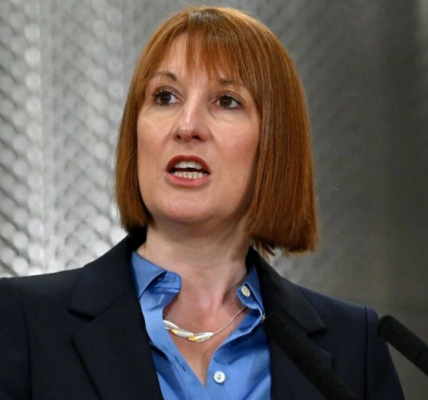Martin Hewitt’s appointment to tackle small boat crossings comes as PM heads to Italy to learn about its immigration policies

Keir Starmer talks with the new UK border security commander, Martin Hewitt, at an airfield near London. Photograph: Phil Noble/Reuters
The appointment of a former police chief to head the new border security command shows ministers are making serious attempts to stop unofficial Channel crossings rather than the “gimmicks” of the last government, the home secretary, Yvette Cooper, has said.
Ahead of talks centred on migration between Keir Starmer and the Italian prime minister, Giorgia Meloni, in Rome, Cooper said such international cooperation was the only way to make progress – but declined to say when the pace of arrivals might drop.
Challenged over criticism from rights groups and some Labour MPs to distance the government from Meloni’s hard-right administration, Cooper said it was very common for the UK to work with governments of other political leanings.
On Sunday night, Martin Hewitt, the former chair of the National Police Chiefs’ Council, who oversaw the UK’s enforcement of lockdown laws during the Covid pandemic, was named as the commander of the border security command.
“We’ve got to take practical steps,” Cooper said, speaking a day after eight people died while trying to cross the Channel in a small boat in the early hours of Sunday morning.
“We know that this has all been driven by what’s become a criminal industry, effectively running along our borders,” she argued.
“There really hasn’t been serious, coordinated law enforcement involving countries right across Europe, all the way along in which the boats are being brought in, the way in which the engines are being put together, coordinating right along the way that the criminal gangs operate. That’s not been done before.”
Asked how soon there would be a reduction in small boat crossings, Cooper said only that the aim was to “go as fast as we possibly can, because nobody should be making these dangerous boat crossings”.
She said: “We’re not going to do this through headlines. We’re going to do it through hard work. We’re not going to just do it through gimmicks.”
The prime minister will head to Rome on Monday to examine how Meloni’s government has cut the number of people arriving in small boats across the Mediterranean by almost two-thirds in the past year, from 118,000 to 44,500.
Meloni has focused on financial deals with north African countries such as Tunisia and Libya to improve border security and stop the boats leaving in the first place.
This autumn she will go further by opening a holding centre in Albania, where asylum seekers picked up at sea by Italian rescue ships will be taken while their asylum applications are processed.
The Refugee Council and Amnesty International have called on Starmer to avoid any more “gimmicks”, while one backbencher questioned why a Labour administration was “seeking to learn lessons from a neo-fascist government”.
Asked about this, Cooper said: “We’ve always had a history of working with governments that have different political parties, that are not aligned. That is a sensible thing for any government to do.
“We have to work with democratically elected governments, particularly those who are nearest neighbours, and particularly those where we have shared challenges that we have to face.”



